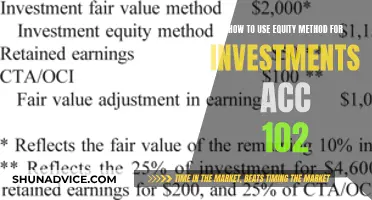
Investing in the stock market can be intimidating for beginners, but online brokers can help guide you through your early investing days by offering intuitive platforms and educational resources. When choosing an online broker, beginners should consider the fees, the platform's ease of use, the range of investment products offered, and the level of customer service provided. Here are some of the best online brokers for beginners:
- TD Ameritrade: Offers a wide range of educational resources, including in-person workshops, articles, videos, and webcasts. It also provides excellent customer service and a user-friendly platform called thinkorswim, which has a built-in learning centre.
- Fidelity: Provides a wealth of educational resources, dependable customer service, and competitive fees. It offers fractional share trading, which allows users to invest in stocks and ETFs with small sums of money. Its Active Trader Pro platform is user-friendly and has features like market screeners and watchlist tools.
- Charles Schwab: Combines competitive fees with a powerful platform and high-quality research and educational materials. It excels in customer service, with 24/7 phone support, text chat, and an extensive branch office network. It also acquired TD Ameritrade, giving users access to the thinkorswim platform.
- E-Trade: Has an intuitive platform that is easy to navigate, with features like technical pattern recognition and live-streaming Bloomberg TV. It offers educational content, including webcasts and a Knowledge section with guided overviews, articles, and videos.
- Robinhood: Known for its user-friendly mobile app, Robinhood offers commission-free trades, beginner-friendly features, and the ability to buy fractional shares of stocks. It also provides news stories from major publications and a fun, informative newsletter and podcast.
| Characteristics | Values |
|---|---|
| Fees | $0 for stock/ETF trades, $0.65 per contract for options |
| Account minimums | $0 |
| Investment options | Stocks, ETFs, options, bonds, mutual funds, forex, cryptocurrency |
| Platform | Easy-to-use, intuitive, mobile app, desktop |
| Customer service | 24/7, live chat, in-person |
| Educational resources | Articles, videos, webinars, live events, courses |
What You'll Learn

Robo-advisors for guided investing
Robo-advisors are a low-cost, online investing platform that uses software algorithms to create and manage investment portfolios for individuals based on their goals and tolerance for risk. They are ideal for those who want a more hands-off approach to investing and don't require the kind of complex financial situation that necessitates a direct relationship with a human financial advisor.
Robo-advisors are paid through their account management fee, which is usually shown as a percentage of the money that you invest. For example, if you put $1,000 into a robo-advisor investment account that charges a 0.25% fee, you'd pay $2.50 for that year's worth of investment management.
Robo-advisors can be a good option for those who are new to investing and want a low-cost, beginner-friendly service. Here are some of the best robo-advisors for guided investing:
Wealthfront
Wealthfront is a robo-advisor with a low required minimum investment of $500 and a management fee of 0.25% for most accounts. It offers a range of features, including fee-free stock investing, a high-yield cash account, automated tax-loss harvesting, and lending capabilities. It also has a digital financial planner, Path, which can answer up to 10,000 queries and help with retirement and college planning.
Betterment
Betterment is ideal for beginners as it has a low account minimum of $0 and a $10 minimum to start investing. It offers multiple portfolio choices, including smart beta, socially responsible investing, and crypto portfolios. It also has a cash management feature with a high-yield cash reserve and checking account. Betterment integrates tax-loss harvesting with client transactions and asset rebalancing to ensure optimal after-tax returns.
SoFi Automated Investing
SoFi Automated Investing has a very low investment minimum of $1 and doesn't charge an investment management fee. It provides access to financial advisors at no additional cost. However, it doesn't offer tax-loss harvesting.
M1 Finance
M1 Finance is best suited for sophisticated investors who want more control over their portfolio. It offers the opportunity to invest in numerous customized portfolios or choose from thousands of ETFs and stocks. It also provides high-yield cash accounts and low-interest-rate margin lending. However, it doesn't offer tax-loss harvesting or access to financial advisors.
Acorns
Acorns is ideal for those who struggle to save as it has a "round-up" feature that automatically invests your spare change. It has a low fee and offers diversified investment portfolio options. However, for small accounts, the fees can be a large percentage of the account value, and it takes a long time to build a meaningful investment amount with the standard round-up feature.
Ellevest
Ellevest is designed specifically for women investors and offers financial management aligned with their career and life situations. It provides tailored investment portfolios and low-cost subscription pricing. However, it doesn't offer tax-loss harvesting or extensive portfolio customization.
E*TRADE Core Portfolios
E*TRADE Core Portfolios is a solid robo-advisor platform with a user-friendly mobile app. It offers multiple investment strategies, including core, ESG, and smart beta. It also provides access to the broad Morgan Stanley lineup of investment and financial management services.
Merrill Guided Investing
Merrill Guided Investing is backed by the resources of Bank of America and Merrill Lynch and offers expansive financial education and tools for beginners and advanced investors. It provides a mix of technology-based investment management and oversight by investment professionals. However, it has higher fees than some competitors and doesn't offer tax-loss harvesting or financial advisor access for the online-only offer.
General Partners: Cash Investment Strategies and Decisions
You may want to see also

Brokers for DIY investing/trading
If you're looking to take a DIY approach to investing and trading, there are several online brokers that can help you get started. Here are some of the top options to consider:
- Robinhood: Known for its user-friendly interface and commission-free trades, Robinhood is a popular choice for beginner investors. It offers an extensive range of investment options, including stocks, options, ETFs, and cryptocurrencies. With Robinhood, you can also buy fractional shares of stocks, allowing you to invest with smaller amounts of money.
- Webull: If you prefer accessing your investment accounts on your phone, Webull is a great choice. It offers a sleek and intuitive mobile app that makes trading on the go a breeze. Webull provides commission-free trading for stocks, options, ETFs, and more.
- Charles Schwab: This well-known broker provides an excellent platform for beginners, offering a wide range of educational resources and trading tools. They also have a paper trading platform that allows you to practice trading without risking real money. Charles Schwab offers commission-free trades for stocks, ETFs, and options.
- Fidelity: Fidelity is a highly regarded broker that offers a comprehensive range of investment options and tools. They have a user-friendly platform and provide extensive educational resources, making it a great choice for beginners. Fidelity offers commission-free trades for stocks, ETFs, and options.
- E-Trade: E-Trade is another popular choice for beginners, offering an intuitive platform and a wide range of investment options. They provide excellent customer support and educational resources to help you get started. E-Trade offers commission-free trades for stocks, ETFs, mutual funds, and options.
- J.P. Morgan Self-Directed Investing: This platform is particularly well-suited for existing Chase customers, as it integrates seamlessly with their banking services. It offers a simple and intuitive interface, making it easy for beginners to get started with investing. J.P. Morgan offers commission-free trades for stocks, ETFs, options, and more.
When choosing a broker for DIY investing and trading, it's important to consider your personal preferences, investment goals, and the level of support and resources you need. Be sure to compare the features, fees, and investment options offered by each broker before making your decision.
Liquidating US Investments: A Country's Cash Out Strategy
You may want to see also

Investment accounts for retirement
Retirement accounts are a great way to save for the future, and there are several options to choose from. Here are some of the most popular investment accounts for retirement:
401(k) Plan
The 401(k) is a tax-advantaged plan that allows employees to save for retirement by contributing a portion of their wages through payroll deductions. Many employers match their employees' contributions up to a certain percentage, providing an immediate return on savings. Contributions are typically made with pre-tax dollars, and taxes are paid upon withdrawal in retirement. However, some plans may offer a Roth option, which allows employees to contribute after-tax dollars and make tax-free withdrawals in retirement. The contribution limit for 401(k) plans in 2024 is $23,000, or $30,500 for those aged 50 and over.
403(b) Plan
The 403(b) plan is similar to the 401(k) but is offered to employees of public schools, certain nonprofits, and other tax-exempt organizations. It also allows employees to contribute a portion of their salary, with tax advantages such as employer matching, higher contribution limits, and tax savings. Like the 401(k), contributions are typically made with pre-tax dollars, and withdrawals are taxed in retirement. The 403(b) is an effective way to save for retirement and can be easily managed through automatic payroll deductions.
Traditional IRA
The Traditional IRA is a tax-advantaged retirement account that individuals can open and contribute to with pre-tax dollars. Contributions and earnings grow tax-free until withdrawal in retirement, at which point they become taxable. The annual contribution limit for 2024 is $7,000, or $8,000 for those aged 50 and over. While the Traditional IRA offers tax benefits and a wide range of investment options, early withdrawals may be subject to taxes and penalties.
Roth IRA
The Roth IRA is a newer version of the Traditional IRA, offering several tax advantages. Contributions are made with after-tax dollars, and withdrawals in retirement are tax-free. Additionally, the Roth IRA provides flexibility, as contributions can often be withdrawn at any time without taxes or penalties. There are income limits for contributing to a Roth IRA, but a "back-door" method exists for high earners. The Roth IRA is an excellent choice for those seeking to maximize their tax benefits and grow their retirement savings.
Solo 401(k) Plan
The Solo 401(k) plan, also known as a Uni-k or One-participant k, is designed for business owners and their spouses. It allows for higher contributions, with elective deferrals of up to $23,000 in 2024, plus a non-elective contribution of up to 25% of compensation. This plan is ideal for those without employees, as it offers higher contribution limits than a SIMPLE IRA and the ability to set up a Roth option, which is not available with a SEP IRA. However, it is more complicated to set up and requires annual reporting once assets exceed $250,000.
These are just a few of the most common investment accounts for retirement. Each option has its own advantages and considerations, so it's important to carefully review and choose the one that best aligns with your financial goals and needs.
Recession-Proof Cash Investments: Where to Park Your Money
You may want to see also

Investment accounts for young investors
Young investors have the most valuable resource on their side: time. The earlier you start investing, the more time your money has to grow. Here are some investment accounts to consider if you're a young investor:
- Tax-deferred accounts: These accounts allow your money to grow and compound free of taxation each year. Examples include individual retirement accounts (IRAs) and company-sponsored retirement accounts such as 401(k)s, 403(b)s, and 457 plans. Remember that you can only contribute money from employment to these accounts and that there are often tax breaks associated with these contributions.
- Roth IRA: A Roth IRA is a good option for younger investors as it allows you to contribute after-tax employment income, which then grows tax-free. You can withdraw the money tax-free in retirement if certain rules are followed. There are income limits for opening a Roth IRA, so check that you're eligible.
- Taxable accounts: These include brokerage accounts, certificates of deposit (CDs), higher-interest depository accounts, and accounts with mutual fund companies. Gains and interest from these accounts are taxable each year, but you generally have greater access to your money.
- Robo-advisors: These technology-based advisors, such as Betterment, Ellevest, and SoFi, invest your money in low-cost investment options like exchange-traded funds (ETFs) based on algorithms tied to your goals. This can be a good option for those starting with little money and who prefer a mobile-based service.
- 529 savings and investing accounts: These accounts are tax-advantaged for education expenses, meaning that investments grow tax-free, and can be used to pay for things like textbooks, tuition, and room and board.
- Certificates of deposit (CDs): CDs are a type of savings account that earns a fixed rate over a fixed term, usually between three months and five years. They provide a safe place to set aside your savings and earn a guaranteed return, but you can't access your money during the term.
- Custodial brokerage account: These accounts are initially in the name of a parent or guardian but are automatically transferred to the child when they turn 18 or 21, depending on state laws.
- High-yield savings account: While not an investment account, a high-yield savings account is a great place for young people to build an emergency fund that earns a higher interest rate than a regular savings account.
Maximizing Investment Returns: Timing Your Cash Withdrawals
You may want to see also

Investment accounts for affluent investors
- Standard Brokerage Accounts: These are the most common type of investment account and offer access to a wide range of investments, including stocks, bonds, mutual funds, and exchange-traded funds (ETFs). They are typically held by an individual or jointly with another person, usually a spouse. There are no limits on contributions, and money can be withdrawn at any time, making them flexible for affluent investors.
- Retirement Accounts: Retirement accounts, such as Individual Retirement Accounts (IRAs), are similar to standard brokerage accounts but offer tax benefits. The two main types are Traditional IRAs and Roth IRAs, offering either upfront tax breaks or tax-free withdrawals in retirement, respectively. These accounts have contribution limits and may have penalties for early withdrawals.
- Investment Accounts for Kids: For affluent investors looking to set up investment accounts for their children, there are options such as custodial brokerage accounts (UGMA or UTMA) and Roth or Traditional IRAs for minors with earned income. These accounts can be used to teach children about investing and build a financial foundation for their future.
- Education Accounts: Education savings accounts like 529 plans and Coverdell Education Savings Accounts (ESAs) are designed to cover education expenses, including college, elementary, and secondary education. They offer tax advantages for qualified distributions.
- ABLE Accounts: These accounts are similar to 529 plans but are specifically designed for individuals with disabilities. They provide tax-advantaged savings opportunities and protect access to public benefits such as Medicaid. ABLE accounts can be used for disability-related expenses, including education, housing, transportation, and more.
- High-Net-Worth Investment Services: Some financial institutions and wealth management firms offer exclusive services for affluent investors with high net worth. These services may include personalized investment strategies, access to private investments, and comprehensive financial planning. While these services typically require a higher minimum balance, they provide a more tailored approach to managing significant wealth.
When considering investment accounts for affluent investors, it is important to evaluate the fees, investment options, tax implications, and level of personalized service offered by each account type and financial institution. Affluent investors may also benefit from working with a financial advisor or wealth manager who can provide expert guidance and help navigate the complexities of their financial situation.
Emergency Cash: Best Places to Invest for Quick Access
You may want to see also
Frequently asked questions
A brokerage fee is a sum of money charged for the services provided by the broker.
A brokerage account is an investment account held at a licensed brokerage firm. In a brokerage account, the account owner can invest in securities such as stocks, bonds, mutual funds, ETFs, options, futures, cryptocurrencies, and forex, depending on the investments offered by the brokerage firm.
Charles Schwab is the best online broker for beginners. The company functions as a full-service broker and a discount broker, offering services that fill the needs of its diverse client base, especially those who are new to investing.







